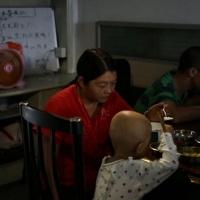Sinopsis
Using more than 99% target language, Learning Chinese through Stories(LCTS) creates authentic and immersive podcasts to help people around the world develop Chinese language skills and cultural competency. It covers a wide range of topics and proficiency levels. Every story has two parts: story (A) and story explanation (B), accompanied by annotated vocabulary and transcript.http://www.learningchinesethroughstories.com/
Episodios
-
1.3.15 笑话《爸爸和儿子》
26/09/2016 Duración: 03minThis is the first episode of our joke telling series. We want to thank our listeners for this great idea! Click on "like" or "I want more!" if you want more Chinese jokes like this. 爸爸问儿子:你将来 娶谁做老婆?儿子说:我要娶奶奶,她疼我!爸爸说:胡说,你怎么可以娶我妈呢?儿子说:你可以娶我妈做老婆,为什么我就不能娶你妈呢! ——摘自http://m.jj59.com/gaoxiaowenzhang/030757.html 将来 jiānglái Noun, future 娶 qǔ Verb, (a male) marry (his partner) 老婆 lǎopó Noun, wife 疼 téng Verb, to care a lot about someone 胡说 húshuō Non-sense
-
2.2.12B 故事解读《黄山奇石》
21/09/2016 Duración: 25min闻名中外 wénmíng zhōngwài Adj, world-famous; well-known to both locals and foreigners 风景区 fēngjǐng qū Noun, scenic area Or 景区 安徽 Ānhuī Anhui province, capital city is Hefei 景色 jǐngsè Noun, scene; view; landscape Or 风景 秀丽 xiùlì Adj, beautiful(only used to describe mountain, forest and natural scenes that have trees) 风景秀丽,景色秀丽 神奇 shénqí Adj, magical 尤其是 yóuqí shì Conjunction word, especially… 有趣 yǒuqù Adj, interesting Or 有意思,好玩 落 luò Verb, to land (on…) 落在… 飞机落在国际机场。The plane landed on the international airport. 山顶 shāndǐng Noun, top of the mountain 山脚,the foot of the mountain 石盘 shí pán Noun, a flat piece of stone that looks like a plate 陡峭 dǒuqiào Adj, steep 一动不动 yí dòngbùdòng Adj, still; like a statue. Verb, to be still. 蹲 dūn Verb, to squat 山头 shāntóu Noun, the top of the mountain (colloquial form) 望 wàng Verb, to look far into the distance 翻滚 fāngǔn Verb, to flip and roll 云海 yúnhǎi Noun, sea of clouds 手臂 shǒubì Noun, hand(s) and arm(s) 巨石 jùshí Noun, giant stone; boulder 巨人, giant man 金光闪闪 jīnguāng shǎnshǎn A
-
2.2.12A 故事《黄山奇石》
21/09/2016 Duración: 03minHave you been to the Yellow Mountain in China? If you haven't, you should put it on your bucket list. This story gives you a glimpse of the most famous boulders on the Yellow Mountain. Anyway, check it out, I mean both this story and the Yellow Mountain. Going through the new word list before you listen to this episode will help you have a better understanding. The word list can be found on www.learningchinesethroughstories.com 闻名中外的黄山风景区在我国安徽省南部。那里景色 秀丽 神奇,尤其是那些怪石,有趣极了。 就说“仙桃石”吧,它好像从天上飞下来的一个大桃子,落在山顶的石盘上。 在一座陡峭的山峰上,有一只猴子。它两只胳膊抱着腿,一动不动的蹲在山头,望着翻滚的云海。这就是有趣的猴子观海。 “仙人指路”就更有趣了!远远望去,真像一位仙人站在高高的山峰上,伸着手臂指向前方。 每当太阳升起,有座山峰上的几块巨石,就变成了一只金光闪闪的雄鸡。它伸着脖子,对着天都峰不住地啼叫。不用说,这就是著名的“金鸡叫天都”了。 黄山的奇石还有很多,像“天狗望月”“狮子抢球”“仙女弹琴”……那些叫不出名字的奇形怪状的岩石,正等你去给他们起名字呢! ——摘自人教版小学语文课本一年级下册
-
2.3.6A 新闻《因病致贫的白血病儿家庭:父亲欲卖肾救女》
20/09/2016 Duración: 04minThis father decided to sell a kidney, so that he could have the money to save his little daughter from leukemia. 75% of the Chinese leukemia patients are from countryside and those families made less than 5000 US dollars each year. The leukemia comes as a devastating blow.You can leave a comment and contact us if you would like to make a donation to help out this family. 因病致 贫的白血病儿家庭:父亲欲卖肾救女 据统计,我国400万名白血病患者中,50%是儿童,其中有超过75%的患儿来自农村,年收入不足3万元。几十万元到上百万元的治疗 费用,对于普通家庭,特别是农村贫困家庭来说,将面临着灾难性医疗支出。 2015年9月,3岁的吴瑾突然低烧、尿血,家人带她去医院检查,结果是高危 急性 淋巴白血病。 吴瑾一家人本来就贫困,几代人都住在偏远的福建寿宁县坑底乡坑底村。为了给女儿治病,37岁的吴文花光了家里所有的积蓄,还东拼西凑借了8万元。住在福州协和医院血液科39病区,很多好心的病友 家属也给吴先生筹了9000多元钱,这让吴先生很感动。然而,相比高昂的医疗费,这只是杯水车薪。无奈,吴文和父母商量,打算去卖肾救女。 吴文的举动引来媒体关注,在社会各界的帮助下,吴文为女儿筹到医疗费已超过10万元,基本 解决了前期的治疗费。而像他这样的家庭,无钱医治的,还有很多。 ——摘自http://news.qq.com/a/20160919/012332.htm#p=1
-
2.1.12B 故事解读《小伙伴》
19/09/2016 Duración: 29min小伙伴 xiǎo huǒbàn noun, companies (that one hang out with) 春游 chūnyóu Noun, spring outing 秋游,冬游 午餐 wǔcān Noun, lunch Or 午饭 早饭,早餐:breakfast 晚饭,晚餐:dinner 一旁 yì páng Noun, one side; away from the majority of the people Or 一边 站在一旁,stand alone 背包 bèibāo Noun, backpack 书包,book pack 丢 diū Verb, to lose 把背包丢了。Lost the backpack. 面包 miànbāo Noun, bread 矿泉水 kuàngquán shuǐ Noun, mineral water 大口 dàkǒu Adv, mouth wide open so one can eat/drink more 大口吃饭,to eat with big bites 大口喝水,to drink with the mouth open wide 糟糕 zāogāo Adj, terrible; awful 粗心 cūxīn Adj, careless 小声 xiǎoshēng (in ) a low voice It can be used as an adjective or an adverb 小声点儿! Be quiet! 小声说话,to talk in a low voice. 低下 dīxià Verb, to lower (one’s head) 低下头 大概 dàgài Adv, probably Or 有可能 以后 yǐhòu In the future; from now on 以前, before 保管 bǎoguǎn Verb, to take care of (one’s belongings); to keep an eye on one’s objects 请保管好自己的财物。Please take good care of your money and belongings. 跟前 gēnqián Noun, an area/place that is very close 他来到我跟前,he came to me. 他家就在跟前。H
-
2.1.12A 故事《小伙伴》
19/09/2016 Duración: 03minAt this beautiful spring field trip day, Masha found she lost her backpack that had her lunch box in it. Three buddies had different reactions and Masha might have just learned who could become her best friend. Going through the new word list before you listen to this episode will help you have a better understanding. The word list can be found on www.learningchinesethroughstories.com 春游那天,到了中午,小伙伴都在吃午餐,只有玛莎站在一旁。 维加问她:“你怎么不吃呀?” 玛莎说:“我把背包丢了,里面装着面包和矿泉水……” 维加一边大口地吃着面包,一边说:“真糟糕!离回到家还有好长时间呢!” 安娜说:“你把背包丢在哪儿了?真粗心!” 玛莎小声地说:“我也不知道。”说着,低下了头。 安娜又说:“你大概是丢在公共汽车上,忘记拿了。以后可要保管好自己的东西。” 这时,安东走到玛莎跟前,什么也没说,把夹 着黄油的面包掰成两半,把大一点儿的放到玛莎 手里,说:“赶快吃吧。” ——摘自人教版小学语文课本一年级下册
-
2.2.11B 新闻故事解读《男子持假信用卡买高档烟酒》
16/09/2016 Duración: 28min男子 nánzǐ Noun, male; guy; man Anonym 女子 天 tiān Noun, day 内 nèi Prep, within (a period of time); inside (a space) 一天内,within one day 学校内,inside school 持 chí Verb, to take; to hold 假 jiǎ Adj, fake 信用卡 xìnyòngkǎ Noun, credit card 刷 shuā Verb, to swipe 刷卡,to swipe a card 点 diǎn Noun, dot 13.4 十三点四 万 wàn Noun, 10 thousand 高档 gāodàng Adj, high-end; fancy 烟 yān Noun, cigarette 酒 jiǔ Noun, wine; alcohol 面 miàn Noun, the top(of a flat object, such as table, credit card, stage) 卡面,桌面,台面 信息 xìnxī Noun, information 却 què Adv, means “but; however”, is always put after the subject of the sentence. Chocolate is yummy, but I do not like it. 巧克力很好吃,但是我不喜欢。 巧克力很好吃,我却不喜欢。 显示 xiǎnshì Verb, to display 咋回事? zǎ huí shì? Why? What happened? What’s wrong? Same with “怎么回事?” 竟 jìng Adv, to express something is unexpected, you can use the adverb 竟然 after the subject. Gucci包竟然100块! A Gucci purse only costs $100! 伪造 wèizào Verb, to counterfeit; adj, counterfeit 某某 mǒu mǒu Noun, used to name someone anonymous 某某人, someone 王某某,someone name
-
2.2.11A 新闻故事《男子持假信用卡买高档烟酒》
16/09/2016 Duración: 02minSpending 134,000 Yuan on expensive cigarettes and fine wine in just 6 days! This guy isn't insane cause he isn't swiping his own credit card. And he got sentenced and a penalty of course. Check it out and get to know more about this news. Going through the new word list before you listen to this episode will help you have a better understanding. The word list can be found on www.learningchinesethroughstories.com 男子6天内 持 假 信用卡, 刷13.4万买高档 烟酒 卡面 信息是中国的银行,刷卡时却 显示是外国人信息,这是咋回事?原来这些卡竟是伪造的信用卡。去年9月,一名男子沈某某 使用伪造的信用卡,到昆明火车站附近的锦江大酒店、佳华广场酒店的POS机刷卡购买中华等高档香烟及酒水,9次共 消费13.4万元。官渡区 法院 一审 判决,沈某某犯信用卡诈骗 罪,判处 有期徒刑 6年零6个月,并 处 罚金7万元。 ——摘自腾讯新闻网http://news.qq.com/a/20160916/014618.htm
-
1.3.14B 故事解读《小白兔和小灰兔》
14/09/2016 Duración: 16min山羊 shānyáng Noun, goat 收 shōu Verb, to harvest 收麦子,to harvest wheat 收玉米,to harvest corns 白菜 báicài Noun, napa cabbage 收下 shōu xià Verb, to accept (gift, money, bribery, etc.) 些 xiē Pronoun, some 一些, some 这些,these 那些, those 菜子 càizǐ Noun, vegetable seeds Or 菜籽 翻 fān Verb, to plow; to turn up( the soil) 翻地 松 sōng Adj, loose 把地翻松, to plow the soil 土松了,the soil is loose now 种 zhòng Verb, to plant 过了 guò le Verb, (a period of time) passed 过了一个月,a month passed; after a month 浇水 jiāo shuǐ Verb, to water 浇花, to water the flower 施肥 shīféi Verb, to fertilize 给花施肥,to fertilize the flower 给白菜施肥,to fertilize the cabbage 拔草 bá cǎo Adj, to pull up weeds 除虫 chú chóng Adj, to get rid of insects; to kill insects 拉 lā Verb, to pull (carts) 干活 gàn huó Verb, to work (colloquial form) Same with 工作 饿 è Adj, hungry 日子 rìzi Noun, days 挑 tiāo Verb, to carry on a pole 担 dàn Noun, load 奇怪 qíguài Adj, strange; weird 只有……,才…… zhǐyǒu……, cái…… 只有(A),才(B) B cannot happen if criteria A is not met. 只有在Amazon上才能买到这个中国货。You can only get this ki
-
1.3.14A 故事《小白兔和小灰兔》
14/09/2016 Duración: 03min"Give a Man a Fish, and You Feed Him for a Day. Teach a Man To Fish, and You Feed Him for a Lifetime". Have you heard about this quote before? Well, this is a similar one, but it is rabbit and napa cabbage instead. Going through the new word list before you listen to this episode will help you have a better understanding. The word list can be found on www.learningchinesethroughstories.com 老山羊在地里收 白菜,小白兔和小灰兔来帮忙。 收完白菜,老山羊把一车白菜送给小灰兔。小灰兔收下了,说:“谢谢您!” 老山羊又把一车白菜送给小白兔。小白兔说:“我不要白菜,请您给我一些 菜子吧。”老山羊送给小白兔一包菜子。 小白兔回到家里,把地翻 松了,种上菜子。 过了几天,白菜长出来了。小白兔常常给白菜浇水,施肥,拔草,捉虫。白菜很快就长大了。 小灰兔把一车白菜拉回家里。他不干活了,饿了就吃老山羊送的白菜。 过了些日子,小灰兔把白菜吃完了,又到老山羊家里去要白菜。 这时候,他看见小白兔挑着一担白菜,给老山羊送来了。小灰兔很奇怪,问道:“小白兔,你的菜是哪儿来的?” 小白兔说:“是我自己种的。只有自己种,才有吃不完的菜。” ——摘自人教版小学语文课本一年级下册
-
1.3.13B 故事解读《司马光》
14/09/2016 Duración: 17min古时候 gǔ shíhòu Noun phrase, ancient times 回 huí noun, time(s) 一回,one time/once 两回,twice 几回,a few times 跟 gēn Prep, (do something) with (someone); and, (noun) and (noun) 我跟朋友去看电影。I went to the movie with a friend. 苹果跟香蕉,apple and banana 花园 huāyuán Noun, garden 颐和园(yíhéyuán),the summer palace 假 jiǎ Adj, fake 假山,fake mountain; rockery 口 kǒu Measure word for vat, water well and family members 一口水缸,一口井(jǐng),五口人 水缸 shuǐ gāng Noun, a big container for water, usually it is made of porcelain 鱼缸,fish tank 浴缸,bath tub 米缸, a porcelain container for rice 烟灰缸,an ashtray for cigarette 装 zhuāng Verb, to contain 把米装到缸里, put the rice into the rice container 满 mǎn Adj, full 爬 pá Verb, to crawl 掉 diào Verb, to fall 掉下来,to fall down 进 jìn Verb, to get in 别的 bié de Adj, other 慌 huāng Adj, to be in panic 别慌!Don’t panic! 吓 xià Verb, to scare (someone) 哭 kū Verb, to cry 叫 jiào Verb, to yell 喊 hǎn Verb, to shout 大人 dàrén Noun, guardians 举起 jǔ qǐ Verb, to lift up… 块(儿) kuài (er) Measure word for stone, rock, candy, chocolate, etc. 石头
-
1.3.13A 故事 《司马光》
14/09/2016 Duración: 02minSimaguang is the writer of the greatest Chinese history masterpiece “Zizhi Tongjian". He was a famous historian, writer and politician in Song Dynasty. This story records his heroic act of saving a drowned buddy in his childhood. It has another well-known Chinese name called "Simaguang smashed the vat" (Simaguang Za Gang) and it is one of the best-known stories in China. Going through the new word list before you listen to this episode will help you have a better understanding. The word list can be found on www.learningchinesethroughstories.com 古时候有个孩子,叫司马光。 有一回,他跟几个小朋友在花园里玩。花园里有假山,假山下面有一口大水缸,缸里装 满了水。有个小朋友爬到假山上去玩,一不小心,掉 进了大水缸。 别的小朋友都慌了,有的吓 哭了,有的叫着喊着,跑去找大人。 司马光没有慌,他举 起一块儿 石头,使劲儿 砸那口缸,几下子就把缸砸破了。 缸里的水流出来了,掉进缸里的小朋友得救了。 ——摘自人教版小学语文课本一年级下册
-
2.1.11B 故事解读《小壁虎借尾巴》
13/09/2016 Duración: 21min壁虎 bìhǔ Noun, gecko 尾巴 wěibā Noun, tail 角 jiǎo Noun, corner 墙角,corner of the wall 街角,corner of the street 蚊子 wénzi Noun, mosquito 咬住 yǎo zhù Verb phrase, to bite into; to grip 挣 zhèng Verb, to break; to snap 断 duàn Adj, to be broken into half 逃走 táozǒu Verb, to escape 难看 nánkàn Adj, ugly 爬 pá Verb, to crawl 河边 hé biān Noun, riverside 摇 yáo Verb, to wave (head or tail) ……来……去 ……lái……qù Back and forth 走来走去,walk back and forth 游来游去,swim back and forth 飞来飞去,fly back and forth 行吗? xíng ma? Does (that) work? Will (it )work? Are you Ok with that? 拨水 bō shuǐ Verb phrase, to push aside the water 拨号,to dial a phone number 拨台,to change a radio channel 甩 shuǎi Verb, to swat 伯伯 bóbo Noun, uncle (dad’s elder brother) 赶 gǎn Verb, to drive away; to expel 蝇子 yíngzi Noun, flies 屋檐 wūyán Noun, eaves 空中 kōngzhōng In the air Or天空中 摆 bǎi Verb, to sway 阿姨 āyí Noun, aunt (mom’s sister or friends) 掌握 zhǎngwò Verb, to acquire the information of…; to acquire/master the skill of… 方向 fāngxiàng Noun, direction(s) 难过 nánguò Adj, upset; sa
-
2.1.11A 故事《小壁虎借尾巴》
13/09/2016 Duración: 03minThis is a scientific story about a little gecko trying to find out a solution after its tail was bitten by a snake. After an adventure of going to different animals and asking for a loan of a new tail, the little gecko learned that its tail would grow back. Going through the new word list before you listen to this episode will help you have a better understanding. The word list can be found on www.learningchinesethroughstories.com 小壁虎在墙角捉蚊子,一条蛇咬住了它的尾巴。小壁虎一挣,挣断尾巴逃走了。 没有尾巴多难看啊!小壁虎想去借一条尾巴。 小壁虎爬呀爬,爬到小河边。他看见小鱼在河里摇着尾巴游来游去。小壁虎说:“小鱼姐姐,您的尾巴借给我行吗?”小鱼说:“不行啊!我要用尾巴拨水呢。” 小壁虎爬呀爬,爬到大树上。他看见老黄牛在树下甩着尾巴吃草。小壁虎说:“黄牛伯伯,您的尾巴借给我行吗?”老黄牛说:“不行啊!我要用尾巴赶 蝇子呢。” 小壁虎爬呀爬,爬到屋檐下。他看见燕子在空中 摆着尾巴飞来飞去。小壁虎说:“燕子阿姨,您的尾巴借给我行吗?”燕子说:“不行啊!我飞的时候,要用尾巴掌握 方向呢。” 小壁虎借不到尾巴,心里很难过。他爬呀爬,爬回家里找妈妈。小壁虎把借尾巴的事告诉了妈妈。妈妈笑着说:“傻孩子,你转过身子看看。”小壁虎转身一看,高兴地叫起来:“我长出一条新尾巴啦!” ——摘自人教版小学语文课本一年级下册
-
1.3.12B 故事解读《胖乎乎的小手》
12/09/2016 Duración: 21min胖乎乎 pànghūhū Adj, chubby 全家 quánjiā Noun phrase, whole family 兰兰 lánlan Chinese nickname for girls. 兰 is a kind of a flower 下班 xiàbān Verb phrase, to get off work 拿 ná Verb, to take/pick something with hands 又 yòu Adv, again; one more time 贴 tiē Verb, to post 墙 qiáng Noun, wall 明白 míngbai Verb, to understand 只是 zhǐshì Adv, only 自己 zìjǐ Pronoun, oneself 那么 nàme Adv, very (+adjective) 替 tì Verb, to do something for someone 过 guò Particle, verb+过,means someone has had the experience of doing something 拖鞋 tuōxié Noun, slippers 洗 xǐ Verb, to wash 手绢 shǒujuàn Noun, handkerchief 姥姥 lǎolao Noun, grandma on mom’s side 厨房 chúfáng Noun, kitchen 一眼就…… yīyǎn jiù…… did something at the first sight 红润润 hóngrùn rùn Adv phrase, rosy and healthy 帮 bāng Verb, to help 挠 náo Verb, to scratch 痒痒 yǎngyang Noun, itch 长大 zhǎng dà Verb, (kid, small animal) to grow up 变成 biàn chéng Verb, to become 事情 shìqíng Noun, thing(s) New words and grammatical structures in the story are being taught in this episode. A lot of repetitions are used
-
1.3.12A 故事《胖乎乎的小手》
12/09/2016 Duración: 02minThis is a modern story that happens in a Chinese family. Chinese girl Lanlan's painting of her own chubby hands got praised by all of her family members. Lanlan's father picked this picture from many of her paintings and hang it on the wall. At first, Lanlan was very confused, but later she learned why from each of her family member. Going through the new word list before you listen to this episode will help you have a better understanding. The word list can be found on www.learningchinesethroughstories.com 全家人都喜欢兰兰画的这张画。 爸爸刚下班回来,拿起画,看了又看,把画贴在了墙上。兰兰不明白,问:“我只是画了自己的小手啊!我有那么多画,您为什么只贴这一张呢?” 爸爸说:“这胖乎乎的小手替我拿过 拖鞋呀!” 妈妈下班回来,看见画,笑着说:“这胖乎乎的小手给我洗过手绢啊!” 姥姥从厨房出来,一眼就看见了画上红润润的小手,说:“这胖乎乎的小手帮我挠过痒痒啊!” 兰兰明白了全家人为什么都喜欢这张画。她高兴地说:“等我长大了。小手变成了大手。它会帮你们做更多的事情!” ——摘自人教版小学语文课本一年级下册
-
2.1.10B 故事解读《要下雨了》
12/09/2016 Duración: 22min要 yào Auxiliary verb, means “soon will”; “is going to” 弯 wān Verb, to bend 腰 yāo Noun, waist 山坡 shānpō Noun, the slope of a hill 山顶(ding),the top of a hill 山脚,the foot of a hill 山腰,the mid of a hill 闷 mēn Adj, stifling 直(起) zhí (qǐ) Verb, to straight up… 直起腰 直起身子 身子 shēnzi Noun, body 伸 shēn Verb, to stretch 腰 yāo Noun, waist 燕子 yànzi Noun, swallow 大声 dàshēng Adv, loudly 喊 hǎn Verb, yell; shout 低 dī Adj, low (一)边……(一)边…… (yī) biān……(yī) biān…… (one) is doing two things at the same time. 他一边吃饭一边看电视。He is eating his meal and at the same time watching TV. 空气 kōngqì Noun, air 潮湿 cháoshī Adj, humid 虫子 chóngzi Noun, bug 翅膀 chìbǎng Noun, wing 沾 zhān Verb, to wet; to soak 水珠 shuǐ zhū Noun, drop of water 正 zhèng Adv, 正(在)+verb…, (someone) is doing something. 我正(在)吃饭。I am eating my meal. 忙 máng Adj, busy. 忙着+verb…, (someone) is busy doing something. 我正忙着做作业。I am busy doing my homework. 捉 zhuō Verb, to catch 往前 wǎng qián Towards the direction of the front 往后,往左,往右 池子 chízi Noun, pool Or 水池 游 yóu Verb, to swim 水面 shuǐmià
-
2.1.10A 故事《要下雨了》
12/09/2016 Duración: 03minThis is a scientific story that teaches people to predict rain from observing animals' change in their behaviors. It is told through a rabbit's lens. 小白兔弯着腰在山坡上割草。天气很闷,小白兔直起 身子,伸伸腰。 小燕子从他头上飞过。小白兔大声 喊:“燕子,燕子,你为什么飞得这么低啊?” 燕子边飞边说:“要下雨了。空气很潮湿,虫子的翅膀沾了小水珠,我飞不高。我正 忙着 捉虫子呢!” 是要下雨了吗? 小白兔往前一看,那边池子里的小鱼都游到水面上来了。 小白兔跑过去,问:“小鱼,小鱼,今天怎么有空出来啊?” 小鱼说:“要下雨了。水里闷得很,我们游到水面上透透气。小白兔, 你快回家吧,小心 淋着雨。” 小白兔连忙 挎起 篮子往家跑。他看见路边有一大群 蚂蚁, 小白兔把要下雨的消息告诉蚂蚁。一只大蚂蚁说:“是要下雨了,我们正忙着往高处 搬家呢!” 小白兔加快 步子往家跑。他一边跑一边喊:“妈妈,妈妈,要下雨了!” 哗,哗,哗,大雨下起来了! ——摘自人教版小学语文课本一年级下册
-
2.2.10B 新闻故事解读《重庆“月饼王”》
07/09/2016 Duración: 23min装 zhuāng Verb, to stuff; to fill 满 mǎn Adj, full 海鲜 hǎixiān Noun, seafood 馅 xiàn Noun, filling(s) In northern China, people say 馅儿 重庆 Chóngqìng City name, Chongqing 直径 zhíjìng Noun, diameter 米 mǐ Noun, meter 月饼 yuèbǐng Noun, mooncake, traditional Chinese food for the Mid-Autumn’s Day 王 wáng Noun, king 标价 biāojià Verb, the price is marked at… 千 qiān Noun, thousand 百 bǎi Noun, hundred 元 yuán Noun, yuan;RMB 陈家坪 Chénjiāpíng An area in Chongqing city 届 jiè Noun, measure word for festival, conference, competition and etc. 第26届奥运会, the 26th Olympic Games 节 jié Noun, festival 春节, spring festival 展览 zhǎnlǎn Noun, exhibition 中心 zhōngxīn Noun, center 开幕 kāimù Verb, to open (ceremony, festival, exhibition) 开幕式, opening ceremony 等 děng Pronoun, etc. 我喜欢吃西瓜、苹果等水果。 余 yú A little bit more than… 十余个,11-15 二十余个,21-25 三十余个, 31-35 省 shěng Noun, province 市 shì Noun, city 品牌 pǐnpái Noun, brand Or 牌子 参加 cānjiā Verb, participate 公斤 gōngjīn Noun, kilogram Or 千克 市民 shìmín Noun, residents of a city 据……介绍 jù……jièshào According to … (sp
-
2.2.10A 新闻故事《重庆“月饼王”》
07/09/2016 Duración: 02minThe Mid-Autumn's Day (Zhongqiu jie) is around the corner. As a traditional food for the festival, Chinese mooncakes are notorious for being overpackaging as well as for their skyrocketing prices. This year, a mooncake king produced in Chongqing is priced at 8888 Yuan, which equals 1333 USD. Check out this news story and find out more about this mooncake. And find the transcript and glossary at www.learningchinesethroughstories.com 装满海鲜馅 重庆直径一米“月饼王”标价8888元 2016年9月6日下午2点,重庆市陈家坪第10届(重庆)月饼节在陈家坪展览 中心 开幕,来自广州、上海、四川、云南等 十余个省市、400多个品牌的月饼参加了本次月饼节。在这次月饼节上,200公斤“月饼王”与市民见面。据负责人介绍,这个“月饼王”里面的馅都是包的海鲜。月饼王重200公斤,厚30厘米,直径1.2米,耗用 面粉80公斤,由6个师傅 日夜赶工2天完成。 ——摘自http://news.qq.com/a/20160907/015856.htm#p=1

































